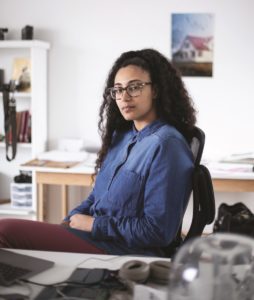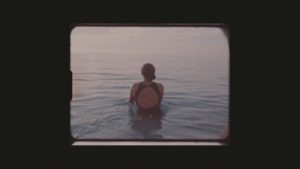In a scene from Yahna Harris’s current film-in-progress, the artist’s aunt sits regally in an armchair. Shot from a low angle, she commands a domestic space. There is no movement: the shot lingers on her form as her voice overlays the still image. “It’s been hidden for so long. Untalked about, untold for so long,” she says. “I don’t need to protect him.” It’s a hauntingly provocative moment.

The film weaves stories about Harris’s mother and her sisters. “I realized they had similar narratives when it came to relationships,” says Harris, who is currently a visual arts fellow at the Fine Arts Work Center. “They all were with abusive partners. I’m examining their lives and the generations that come after.”
Harris says from a young age she knew she wanted to make films and has always been fascinated with how a film can have an emotional effect on the viewer. Because her military family moved a lot in her childhood, Harris would get her neighbors together to make original movies or recreate Hollywood films on VHS tape. (She mentions Goosebumps as a favorite subject.) Later, as a film student at Boston University, she strained against an environment that emphasized technical issues and a more careerist bent. “But I wanted to do more art and more expressive things,” says Harris. “There was definitely tension there.”
She eventually found community — and creative opportunities — in a group of other students. “We were really scrappy and imaginative about using our resources in order to have more access to film and filmmaking,” she says. “That allowed us to experiment with different styles and to have a community mindset in filmmaking.”
In both her commercial work and personal projects, Harris is known for her intimate, often vulnerable approach to filmmaking. She achieves this through not only technical savvy but an intuition about when to put the equipment away.
“I can be a tech nerd — I’ve read so many camera manuals,” says Harris. “Being able to know the technicalities of the equipment allows me the freedom to be more present and more vulnerable in the moment of filming.”
Working with her family on her current project, Harris often opted to reduce the amount of equipment she used. “To be vulnerable with a person, you have to reduce the gear,” she says. At one point during filming, she put the camera away: “I was just lying side by side in bed with my cousin and a microphone, just talking about her story,” she says. “Sometimes stories are so powerful that the visuals can be a distraction.”
Harris began working on the material in 2018 during a month-long visit to Hagerstown, Md., her mother’s hometown. She was on her way from Boston to Los Angeles, where she was moving to work as a cinematographer.
“I really wanted to stay with my grandmother and interview her about family history,” says Harris. “It snowballed into a much larger project.” Intrigued by the death of her grandfather, who died when her mother and aunts were young adults, Harris began interviewing other family members. “His death severely affected his daughters,” she says. “That sorrow of dealing with a parent’s death affected their navigation of love.”

In the film, she represents her grandfather via ghostly gestures: a swaying chandelier, a slow-moving shot through the empty interior of her grandmother’s home. These shots, as well as recreated scenes, complicate the conventions of a documentary.
Once Harris arrived in Los Angeles and began filming commercial projects like music videos and advertisements, this more personal project continued to simmer on the back burner, driven by a desire to understand her family better. “I continued to fly back and film because I hadn’t realized how much they had experienced,” she says.
Harris’s own experience and her cousin’s became another chapter in her family’s history. “There are moments where I film my cousin and she’s just laughing and in love with her person,” says Harris. “We’re able to make better decisions for ourselves and participate in love and find moments of joy, in part, due to what our parents had to experience, what they taught us, and how they have supported us.” As a result, Harris’s film shifts in mood throughout. Stories of domestic violence are countered with images of her cousin dancing and smiling at a party, which Harris captures in woozy slow-motion shots. There are also straightforward scenes like one in which her aunt cooks while talking about discovering herself after motherhood.
Harris’s residency at the Fine Arts Work Center has allowed her to fully focus on editing her film without distraction from other work. Her upcoming exhibition will be her first time presenting such personal work to the public, and none of it is available to view online.
“I am working with family members to feel what is right for presenting the work,” she says. “A lot of times, Black people are put on display. That is part of the reason why I’m so hesitant for people to have access to it.”
Harris says that her mother and grandmother will come to Provincetown when the film is exhibited, and while she’s nervous about them coming she’s also excited. “I’m glad that it’s being shown here, in this context with this community,” says Harris. “I feel people will be supportive.”



